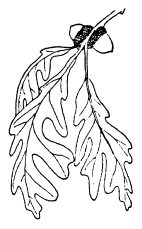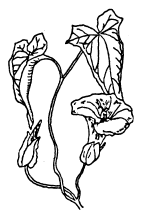Authors: Louise McNeill
Milkweed Ladies (9 page)
In late summer, when the long, delicate green milkweed pods were full, we would strip off the outer pods and carefully take out the silky white insides. These were our “milkweed ladies,” as pure and delicate as soft white dove-birds, there on our rock cliff in the sun. We would invite them to
“tea,” a crowded three of them sitting so ladylike on our moss sofa; and we, in our millinery hats, serving them. We would tell them in high-pitched Southern voices, about the Ladies' Aid meetings and the strawberry festival down at the church; and one day I made up a rhyme:
Â
Milkweed ladies so fair and fine,
Won't you have a sip of my columbine?
Or a thimble of thimbleberry wine?
Â
As we talked and laughed, the golden finches that frequented the thickets flashed back and forth, and their gold and black wings caught the slants of sun.
Sometimes Mama came up to our “house” and visited us, and we would show her our flower hats. When Mama was a girl, she had dreamed of being a milliner, sitting in a fine shop somewhere and sewing flowers on beautiful ruffled hats. Sometimes now, I can still see her standing there on the hillside with a wild pink rose in her hand. To her, through all life's tragedies and brute labor, the flowers waited with their sweet surcease. On Sunday afternoons, she would go with us to the woodland or over into the meadows and find the wild flowers, in their season, full in bloom. In earliest spring, we found the arbutus hiding under the leaves and last snowfall. Then the white bloodroot
opened, and we found Jack-in-the-Pulpit on the edge of the wood. In June we went to the Indian graves to find the pink moccasin flowers; and in autumn we found the bluebottle gentians by the swamp. On the mossy cliff up in the Little Woodland were the lavender and blue hepaticas that bloomed in April; and all around them, on the moss of the rock, the trailing long-hearted leaves of the walking fern, the frail ebony stems of maidenhair.

Sometimes, I went with Granny Fanny to gather her medicine tea in the run-out field over near old Tommy's cabin where the sedge grass and the briers and thistles grew harshly from their worn-out earth. But growing there, all winter, were the dry austere blooms of the pearly everlasting, the “life everlasting” that Granny took home to boil for a fragrant, half-bitter tea. From Aunt Malindy, what I kept was her fireball screaming above the Buckley Mountain the night her brother Potts was killed. But it was the
name
of Granny Fanny's flower that I loved and remembered and kept with me; the “life everlasting,” living there above the winter, beyond the storms.

O
nce fifteen million acres of virgin forest
stretched from the top of the Allegheny range to the Ohio River shore; and, when I was a child, G.D.'s and Uncle Dock's part of it ran for sixty unbroken miles beyond our Pinnacle Mountain: a quarter million acres of hardwood forest. For over a hundred years, our menfolks and all the other Swago hunters walked it as though it belonged to them.

Every spring and every fall, G.D., Uncle Dock, Cousin Rush, and my brother Ward took off Over the Mountain for their fishing trip to Cranberry River, to Williams, and Gauley, and Black Mountain Run. It was a fifteen-mile trip into the wilderness, and the day before Mama would make up eight or ten bread flat cakes, while we children dug several hundred slithery fishing worms and packed them into Prince Albert tobacco tins. Among the doubtful prophecies of weather, G.D. and Ward would pack
up their old haversacks, Mama's big tin frying pan, the red snuff boxes for farmer matches, the blackened tin bucket for boiling coffee, and two or three big cloth sugar sacks to carry the fish home in. At the very last, they strapped the fish rods on, and the pocketknives, hooks, and leaders. They took no map, and no compass. Though they were forever getting lost in some alder thicket, they must find their direction by the lay of the land, the flow of the waters, the shadows, or the star.

It would be just before dawn as Mama, Elizabeth, Granny Fanny, and I draped on the yard fence to watch their four misty shadows humping one after another up our pasture slope. They disappeared northwest into the forest. I knew I could never go with them, but I followed them still in my mind. Down in my heart, I knew every trail and wood sign from learning them by the fireplace in winter, and on the porch at harvest noon. I knew I could walk it blindfolded: the steep open trail up to Beech Spring; then into the forest again; north past the overhang of High Rocks; down onto the wild headwaters with the forest around me, darkness at midday, the great oaks and the deep pavilions of shade. If the men went by way of the Gallegly, I could look down and see the rolling savannahs of bluegrass, mile
upon rolling mile of open grassland sweeping down to the forest and river shore. As I had learned it, I had learned it deep: the farthest place, the ultimate passage.

All morning long, as I helped Mama with the milking and the hogs and chickens, I followed the men northwest. I could see them clearly, sitting by their campfires in the evening, their beds of moss spread out for the night, the brook trout frying in the pan. I knew they would be telling how they heard the wind and the sounding water; and the stories again about Captain Jim's time, or even back to Old Tom's time when panther had roamed Over the Mountain, and Old Tom had seen the eastern bison in small droves, great shaggy black-humped bison coming down at sunset to cross the ford.
Over at home, the week was a long and dreary one: the garden to tend, the cows to milk, working all day with my mind off somewhere, and then at evening I would watch the pasture slope. At last, they would come in smelling of fish and woodsmoke and rotten fishing worms. Standing in the lamplit kitchen, they would pour their shining loads out into Mama's big dishpans: silver cataracts; silver-sided, orange-bellied, red-speckled trout that G.D. called the “speckled beauties,” brook trout, wild and
saltedâa hundred or a hundred and fifty of themâlike a mountain stream. After supper, out on the porch, they told of the big one Uncle Dock lost in the Red Hole; of the great fishing they had found on Cranberry; or of the flock of turkeys flushed out at Barlow Top.
When it all changed, it was not suddenly. There was no sudden summer or sudden fall; but gradually, as the years moved by, the song turned sour as the north fork of Cranberry River turned muddy. It had already begun in the 1880s, when the white pine had been cut and sent down the Greenbrier River. When the white pine loggers had come, they had brought the river-driving French Canucks. The log chutes on the skid trail glittered with ice, and they were greased with black-strap oil; the great logs roared down the chutes to the crick side. G.D. and Uncle Dock told that on a clear day when the logs were running, you could hear their heavy, screeching roar fifteen miles down river. And down at the cricks, where the loggers built their splash dams, the white pine logs splashed and swirled into the river on their way to the Ronceverte Mill.
Then there was big money in the county, and plenty of quick talk. Up at town, brick-and-brownstone
houses were built; hardware stores and whiskey stills flourished; and boardwalks were laid down. But our Over the Mountain was hardwood country, and hardwood floats too heavy. And Uncle Dock insisted, “By God, they can't take her. She's too big for them.”
Hardwood
can
go out by log train; and before 1900, the railroad came, and the Italians came to build it through the steep river-cuts. They camped in shanties all along the river, and G.D. told of the shanty down on Buckley's farm that was blown to bits one night, hardly a shred of flesh left. When he went down the next morning, he found a little embroidered wool bag in bright reds, blues, and yellows, hanging up in a tree. Inside it was a woman's and a child's picture, and G.D. brought it home and kept it down in a trunk.
The day of the First Train, October 26, 1900, there was a big “speaking” up at town as the great locomotive came screaming up the valley, and the men from the railroad gave an ox roast with all the bankers, storekeepers, and lumber kings. Soon the narrow-gauge railroad began to creep up the Williams, and then its branches stretched up Tea Crick, Mountain Lick, and all the little feeder streams; and it began to carry the hardwood out.
Still, through most of the years of my childhood, G.D., Uncle Dock, Cousin Rush, and Ward went Over the Mountain and brought home sacks of salted brook trout to pour into Mama's big pans. The change came slowly, and slowly a deep lament began to run through their stories: for the muddy, silted streams; the forest fires; the skid roads bleeding down the eroded hills; and the terrible waste of it all. When the jackleg lumber companies went bankrupt, the lumber shanties were abandoned, and the rusting, twisted rails. The trout began to die with sawdust in their gills, and the great ravaged trees were left rotting along the ridges' slopes.
All of us along Swago Crick were tainted by the lumber boom. Back in the 1880s, a lot of our kinfolks, uncles and cousins, had gone into the white pine business as raftsmen and teamsters. And Captain Jim had had to sell his Woodland Up-the-Hollow to the loggers. In the early 1900s, when the sawmill shanty town was built over on the Buckley Flatts, G.D. went to work for them as a bookkeeper because he needed the money to piece out his farming and teaching school. At last, Uncle Dan'l had to sell his dying chestnut orchard to the lumber companies.
But the men would still go Over the Mountain,
persisting in it, as though the change had not come, as though they had to find it was not true. They would come home early, bringing only a few fish in their haversacks, and every time with new dark chords to add to their lament: even on the Mountain Lick, they would tell; even on Tea Crick there were scars; and ravage on Black Mountain Run.
Uncle Dock died before the Great Fire of 1930, and G.D. told how the last laugh Uncle Dock ever laughed was when he raised up on his pillow and remembered a time, long back, when he had taken G.D. as a little boy Over the Mountain to fish. He told how G.D. had caught a big one, got tangled up in the fish and fishline, and had fallen head first into the pool. After Uncle Dock died, G.D. was withdrawn and silent, and he smoked his pipe cold. But he still went Over the Mountain, often going alone and coming back the same day, until one summer he stopped going and never went again.

The Great Forest Fire of 1930 raged from the headwaters of Gauley to Panther Crick and then swept up the valley and almost over the Elk. All week down at the village, a smoke pall hung over the schoolyard, and our cow spring up the hollow tasted of smoke. In the wind that fed it, the black, charred leaf-scraps sifted down over our
fields and pastures. After the rains came, Ward and Jess went over and walked it, all day through the black and ashes. They saw the roots of the great stumps sticking up three feet above the burned out topsoil as though they still tried to clutch the earth.
It was after the Great Fire that G.D. began to refer to Over the Mountain as The Bonnie. When G.D. was dead and Ward was the old one, Ward said that there was no place called The Bonnie, that the real name of it was Bannock Run, and that it was named for a Scotch pancake. But I know that G.D. did call it The Bonnie along at the last, and he even referred sometimes to Bonnie River. Slowly, as G.D. grew older, some several years after I was married, he began to tell my husband how it all had been: the long pavilions of shade, the clear rolling rivers, the old trails and starry camps. One night, G.D. stopped suddenly in the middle of a sentence and left it hanging there. He never mentioned Over Bonnie again. Instead, he sat in his chair by his old Sea Chest and told me and my husband about the sea: the day they moved through Magellan Straits, or the night of the great storm out on the Pacific; and Over Bonnie was, for G.D., just as though it had never been.
But for me, the lumber companies had
not cut The Bonnie, nor the Great Fire burned it to blackened claws. Because I was born a woman and had not gone,
could
not go, it lay for me as I had first found it as a girl-child by the winter fireplace, listening to the men's wonder tales. In my obsession and possession, the hunter men still walked. The great trees lifted forever across my vision, and the sounding waters still ran. My dream of the American forest was deep and mystic and old; but the dream itself was always in the distance, moving before the seekers like the sun.

